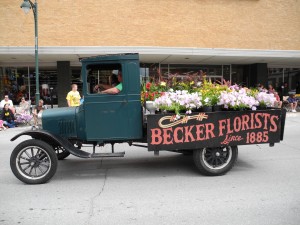The Fort Dodge Messenger: June 10, 1905
Are Many Rooters in Neighbor Towns
They Get Result of the Game as Soon as Known Here
Bet Money, Chalk or Marbles
Back Their Favorite Teams to Win – They Get The Score By Innings on All Iowa League Games Played in Fort Dodge
Evidently base ball enthusiasm is at a high temperature about Fort Dodge. The surrounding towns seem to be obtaining the reports of the Iowa League ball games at the same time as the local fans get them. While the games at Fort Dodge are in progress a good-sized crowd is in the store where the long distance telephone is, following the game with intense interest. The members of the crowd always have their favorite team and are also ready to back it. The reports come in by innings and often after a game a large number of cigars or a number of small amounts of coin change hands. Fort Dodge is the metropolis of the surrounding county and is looked to for a great deal of amusement. When any inhabitants of the surrounding towns are in the city they invariably attend the ball games. The baseball association is therefore seen to be doing good work in advertising the town and offering some inducement to the people to come here.
The interest manifested in Duncombe over the ball games may be seen by the following clipping from the Duncombe paper: “Uncle George Palmer and a number of the other baseball fans of this place became very much worked up over the Fort Dodge-Marshalltown game played in Fort Dodge Tuesday morning. Uncle George had figured that Marshalltown had a sinch (sic) on the game and was backing up his figures; but luck was against him, and he will support Marshalltown no more, especially when they are pitted against hte Gypsumites.”
Traveling men say that the fans of all the surrounding towns know as much about the team as the home fans and are more enthusiastic. Manson, Lake City, Rockwell City, and all other towns of equal distance get the result of the Fort Dodge games by innings by telephone.








